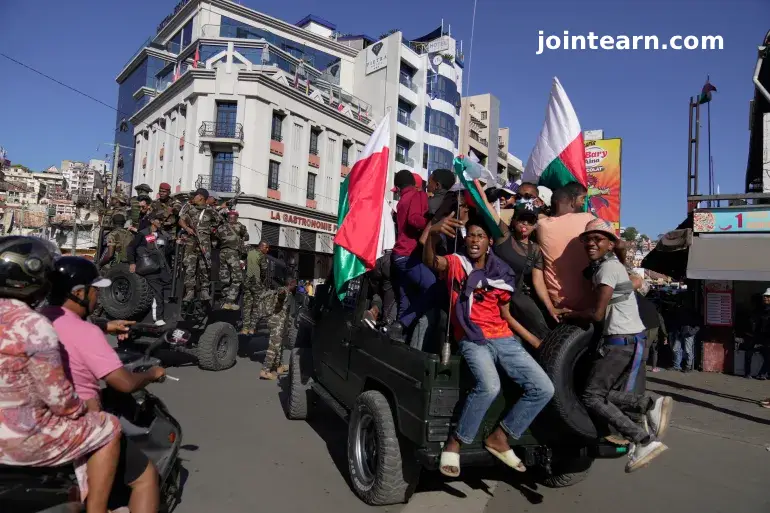
As President Andry Rajoelina fled Madagascar amid mass protests, the army assumed control, leaving a nation in uncertainty. Gen Z protesters—driven by demands for basic services like clean water, electricity, and dignity—have emerged as a powerful force shaping the country’s political future.
Chaos and Hope in Antananarivo
On Sunday morning, in the Mahamasina suburb of Antananarivo, residents like 22-year-old Sarobidy Ramarimanana faced the daily struggle of accessing water. A routine trip to fill her jerrycan was interrupted by police sirens and chaos.
“I picked mine up and ran, too. I was scared,” Ramarimanana said, describing the panic as people tripped over jerrycans scattered across the street.
Weeks of antigovernment protests, sparked by severe cuts to electricity and water supplies, had left fear and frustration etched into daily life. For many young Malagasy, these shortages symbolize a government that has failed to provide essential services.
Ramarimanana later joined a protest at Independence Square, holding a yellow jerrycan and a small tin-can lamp—“jiro-kapoaka”—symbols of the youth movement’s struggle.
“We fetch water in the dark, we sleep through power cuts, and they tell us to be patient? For how long?” she asked.
From Basic Needs to Political Action
Since September 25, the Gen Z Madagascar movement has led demonstrations that began with frustration over power and water outages but quickly expanded into calls for Rajoelina’s resignation. Protesters blocked roads with burning tyres and rocks, while police responded with rubber bullets, tear gas, and stun grenades. The UN reports at least 22 deaths during the unrest.
Despite Rajoelina’s attempt to reshuffle the government and appoint a new prime minister, the youth viewed his moves as superficial. The appointment of a military general fueled distrust, culminating in the largest protests of the period.
CAPSAT Defection and Rising Hopes
An elite army unit, CAPSAT, previously allied with Rajoelina, defected to join protesters. For demonstrators, this shift brought cautious optimism. Jose Raharimino, a freelance photographer, described the scene:
“We weren’t angry yet. We were desperate, but it felt like we were together in that desperation.”
The sense of unity was short-lived, as police tear gas disrupted the crowd, forcing protesters to scatter while trying to protect themselves and their symbols of resistance.
Rajoelina Flees, Military Assumes Control
In response to CAPSAT’s defection and escalating protests, Rajoelina called the army’s move an illegal coup and fled. By Tuesday, parliament voted to impeach him for desertion, while the military formed a transitional committee with promises to restore civilian rule.
For many, this swift change evoked memories of 2009, when similar protests led to Rajoelina’s initial rise to power through a military-backed coup.
Gen Z Demands Structural Change
Young protesters emphasize structural reform over mere leadership change. Entrepreneur Henintsoa Andriniaina, 24, explained:
“We’re not here for violence or revenge. We’re people trying to live. We need leaders who serve, not steal. Change means building systems that outlast people—transparent budgets, fair opportunities, and power that belongs to citizens, not to offices.”
Signs reading “Miala Rajoelina! Mila rafitra vaovao! Tsimbazaza miray!”—translated as “Rajoelina out! We need a new system. Tsimbazaza united”—highlight the movement’s call for unity and accountability.
Uncertain Future Ahead
Observers like Luke Freeman from University College London warn that Gen Z protesters may face challenges in transitioning from street activism to political negotiation. Leadership structures will need to form to participate effectively in shaping Madagascar’s future.
Despite the military takeover, many young Malagasy remain focused on basic human needs rather than symbolic victories. Ramarimanana said:
“We can’t dream of democracy if we can’t drink clean water. Change starts when every home has what it needs – not promises, but pipes that work and lights that stay on.”
Voices of the Elder Generation
For older citizens like Bako, a 56-year-old street cleaner, the current protests echo the struggles of the past.
“I’ve seen this before…Now, it’s the children of those who shouted before. And they’re crying again…Because they want what I wanted too – just a little dignity.”
As Madagascar navigates a post-Rajoelina era, the country faces a delicate balance between hope and uncertainty, with young citizens demanding not just political change, but basic services, transparency, and fairness.


Leave a Reply